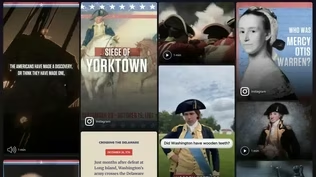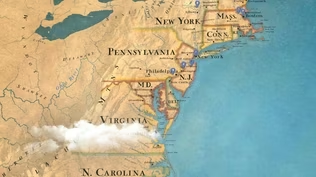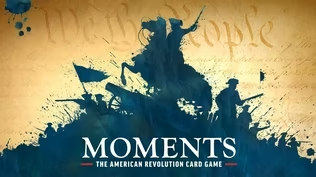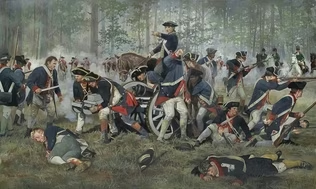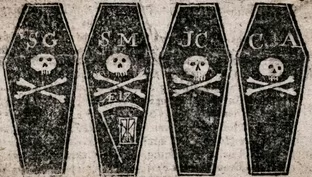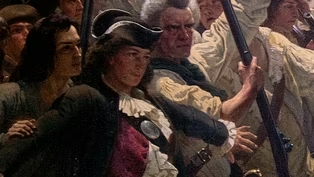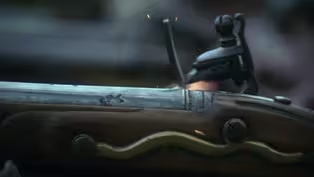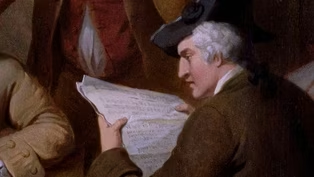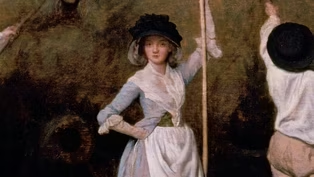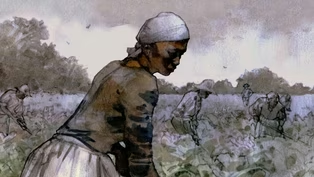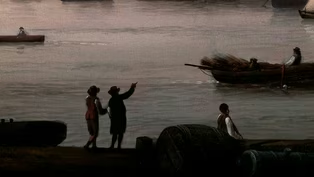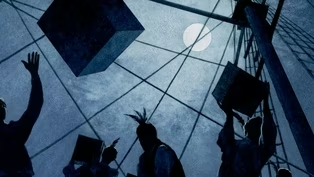
The Shot Heard ’Round the World: Lexington, Concord and the Start of War
Clip: Episode 1 | 11m 39sVideo has Closed Captions
Tensions erupt as colonists confront the British Army at Lexington and Concord, beginning the war.
The Patriots catch wind of a secret British plan to move troops from Boston into Concord and they dispatch William Dawes and Paul Revere to warn other Patriots that the British are coming. The British attack a Patriot force in Lexington, but they are overwhelmed by hundreds of militiamen pouring in from the countryside and forced to retreat to Boston. The American Revolution has begun.
Problems playing video? | Closed Captioning Feedback
Problems playing video? | Closed Captioning Feedback
Episodes presented in 4K UHD on supported devices. Corporate funding for THE AMERICAN REVOLUTION was provided by Bank of America. Major funding was provided by The Better Angels Society and...

The Shot Heard ’Round the World: Lexington, Concord and the Start of War
Clip: Episode 1 | 11m 39sVideo has Closed Captions
The Patriots catch wind of a secret British plan to move troops from Boston into Concord and they dispatch William Dawes and Paul Revere to warn other Patriots that the British are coming. The British attack a Patriot force in Lexington, but they are overwhelmed by hundreds of militiamen pouring in from the countryside and forced to retreat to Boston. The American Revolution has begun.
Problems playing video? | Closed Captioning Feedback
How to Watch The American Revolution
The American Revolution is available to stream on pbs.org and the free PBS App, available on iPhone, Apple TV, Android TV, Android smartphones, Amazon Fire TV, Amazon Fire Tablet, Roku, Samsung Smart TV, and Vizio.
Buy Now
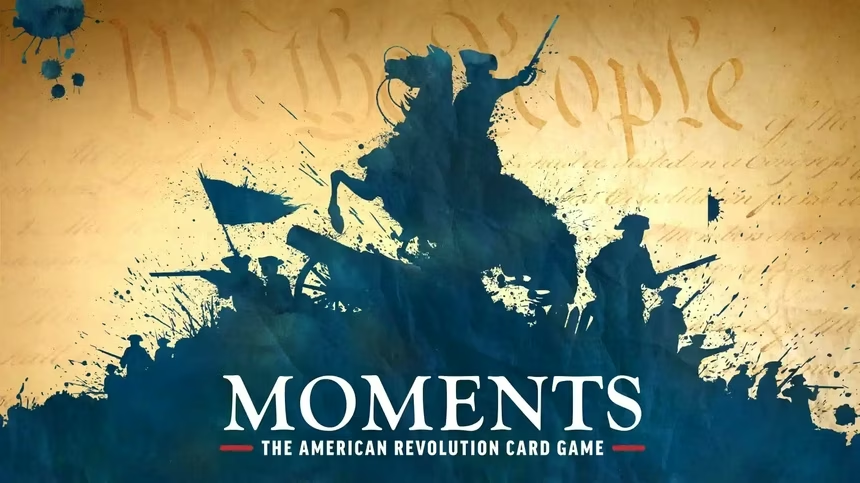
MOMENTS: The Revolutionary War Card Game
Use your knowledge of Revolutionary-era moments to build a timeline of real historical events.Providing Support for PBS.org
Learn Moreabout PBS online sponsorship[Dog barking] Late on the evening of April 18, 1775, 700 British regulars were awakened, not told where they were going, and silently marched through the dark empty streets of Boston.
A fleet of boats was waiting to row them across the Charles River to the Cambridge marshes.
For all the care the British had taken to keep their plans secret, Dr.
Joseph Warren, one of Boston's leading rebels, got wind of it.
You don't move 1,000 men out of Boston in the middle of the night without arousing a response.
American rebel leaders send warning.
Two men, William Dawes and a silversmith named Paul Revere, are sent in different routes to alert Samuel Adams and others in Lexington that the British, in fact, are coming.
Narrator: Before the two men left, Revere saw to it that 2 lanterns appeared in the belfry of the Old North Church just long enough to alert sympathizers on the mainland that the regulars were crossing by water to Cambridge, not marching overland through Roxbury.
[Racing hoofbeats] Voice: Time will never erase the horrors of that midnight cry, when we were roused from the benign slumbers of the season with the dire alarm, that 1,000 of the troops of George III were gone forth to murder the peaceful inhabitants of the surrounding villages.
Hannah Winthrop.
♪ Narrator: Just after midnight on the morning of April 19, 1775, Revere reached Lexington and the house where Adams and Hancock were hiding.
"The Regulars are coming out!"
he shouted.
The two rebel leaders fled into the night.
[Bell tolling] Lexington's militiamen, summoned from their beds, dressed, gathered up whatever weapons they happened to own, and hurried to the town green.
Their commander was Captain John Parker, a farmer, who, like many of his 70 men, had fought alongside the British in the French and Indian War.
♪ Then, shortly before dawn, someone spotted 6 companies of redcoats-- about 250 men--approaching at a rapid clip.
On horseback in the lead was Major John Pitcairn, a Scottish veteran with nothing but scorn for colonists.
Captain Parker knew he could not stop the British, but he wanted to impress them with his men's resolve.
Parker told them not to fire first.
A British officer shouted, "Throw down your arms, ye villians, ye rebels, and disperse."
Atkinson: They begin to disperse.
Many of them turn their backs and start to walk away.
[Click, gunshot] A shot rings out.
No one knows where the shot came from.
Man: Fire!
[Gunshots] That leads to promiscuous shooting... mostly by the British.
[Heavy gunfire] It's not a battle.
It's not a skirmish.
It's a massacre.
Now blood has been shed.
Now the man on your left has been shot through the head.
Your neighbor on the right has been badly wounded.
You can't put that genie back in the bottle.
Narrator: 8 militiamen died on the Lexington Green.
9 more were wounded.
The rest fled.
Atkinson: The fact that the British have fired on their own people, which is how it's viewed by the Americans, causes an outrage that takes it to a new level in terms of resistance, a feeling that, um... "They're killing us, and the only thing "that we can do in response is to kill them as quickly as we can in numbers as profound as we can."
[Gunfire] Man: Charge!
Narrator: The British resumed their march toward Concord, now just 6 1/2 miles away.
[Bell tolling] Meanwhile, other riders fanned out across the countryside to spread word of what had happened.
Militiamen from nearby towns rushed toward Concord.
"It seemed as if men came down from the clouds," one man said.
It was not memories of the Stamp Act or the tax on tea that rallied them.
"We always had governed ourselves," one man remembered, "and we always meant to."
In Acton, 6 miles to the west of Concord, 40 Minutemen gathered at the home of their commander, Captain Isaac Davis, a 30-year-old gunsmith.
Voice: My husband said but little that morning.
He seemed serious and thoughtful.
As he led the company from the house, he turned himself round and seemed to have something to communicate.
He only said, "Take good care of the children," and was soon out of sight.
Hannah Davis.
[Gunfire] Narrator: The British seized 2 bridges spanning the Concord River and spread throughout the town.
[Glass breaks] They entered houses, broke into barns and outbuildings.
Most of the arms and provisions they'd hoped to find had either been shifted elsewhere or successfully hidden.
But they did smash open 60 barrels of flour and destroyed several wooden gun carriages before setting it all ablaze.
Atkinson: The decision is made by the American commanders on the scene that we're not gonna fight in Concord.
We will retreat across the Concord River, across the North Bridge, and we will wait for them on the other side.
Narrator: By then, some 450 militiamen were clustered together on a hillside overlooking the North Bridge, still under strict orders not to fire upon the King's troops unless fired upon.
But when they saw smoke rising from town, they concluded that Concord itself was burning.
At North Bridge, the American soldiers, the militiamen, see this and they say to each other, "They're burning down our town.
Are we gonna let them burn down our town?"
And that's when they march to the bridge.
Narrator: 3 companies of British regulars now guarded the bridge.
Isaac Davis, the gunsmith from Acton, was picked to head the column sent towards it.
Suddenly, without orders, a redcoat fired his musket.
The front line of British troops followed with a ragged volley.
A musket ball tore through Isaac Davis' chest, severing an artery and spraying blood on two men coming up behind him.
Abner Hosmer, another member of his company, was shot through the head.
"God damn them," a militia captain shouted.
"Fire men, fire!"
[Rapid gunfire] At least 8 redcoats were hit, including 4 officers.
The British began to back away, then to run.
When one wounded soldier struggled to his feet and tried to follow, a militiaman split his skull with a hatchet.
The British regulars regrouped and began the long march back to Boston.
Voice: Before the whole had quitted the town, we were fired on from houses and behind trees.
And before we had gone half a mile, we were fired on from all sides, but mostly from the rear, where people had hid themselves in houses till we had passed and then fired.
[John Barker] [Gunfire continues] Atkinson: Every step of the way becomes more intense.
[Click, gunshot] The sound of bullets winging around them.
The sound of bullets hitting soldiers, this deep thud, as if you're beating a rug... [Gunfire continues] screams of men who've been wounded in the British column.
[Horse nickers] And it's beginning to look as though the column could be destroyed.
Narrator: The British were in complete disarray as they staggered into Lexington.
But now filling the road ahead of them were more than 1,000 much-needed reinforcements.
[Cannonfire] Two British cannon swept the Lexington Green, and one ball smashed through the wall of the meetinghouse.
Several houses were set on fire, but the redcoats were still outnumbered and under relentless attack.
They resumed their retreat to Boston.
[Gunshot] Voice: We retired for 15 miles under an incessant fire, which like a moving circle surrounded us and followed us wherever we went.
It was impossible not to lose a good many men.
General Hugh Percy.
Conway: The retreat from Concord was a truly horrifying event for many British soldiers.
It would have been a fairly traumatic experience, to put it mildly, to be shot at from all sides by people you didn't believe were going to shoot at you.
Narrator: In the village of Monatomy, the fighting was house-to-house.
A militiaman named Amos Farnsworth remembered entering a home to find a pool of blood that half-covered his shoes.
Voice: The bloody field at Monatomy was strewed with mangled bodies.
We met one affectionate father with a cart, looking for his murderd son, and picking up his neighbors who had fallen in battle.
Hannah Winthrop.
Narrator: In Boston, crowds watched as the redcoats straggled back.
The British had suffered 273 casualties, including 73 dead.
♪ 95 Americans had been hit over the course of the day, 49 of them fatally.
Family members moved along the road looking for missing sons and brothers and fathers.
In Acton that evening, Hannah Davis and her 4 children looked on as men of her husband Isaac's militia company carried his corpse through her door.
Voice: He was placed in my bedroom till the funeral.
The bodies of Abner Hosmer, one of the company, and of James Hayward, who was killed in Lexington in the afternoon, were brought by their friends to the house, where the funeral of the three was attended together.
[Davis] ♪
Video has Closed Captions
Clip: Ep1 | 7m 52s | A bloody clash between Bostonians and the British army leaves five dead in the Boston Massacre. (7m 52s)
Video has Closed Captions
Clip: Ep1 | 9m 39s | The American Revolution will be a war that will pit brother against brother – and birth a nation. (9m 39s)
Video has Closed Captions
Clip: Ep1 | 43s | A single shot echoes on Lexington Green, and the American Revolution begins. (43s)
Video has Closed Captions
Clip: Ep1 | 50s | A spark ignites—quiet, unstoppable. What follows changes everything. (50s)
How Land, Taxes and Rebellion Sparked the American Revolution
Video has Closed Captions
Clip: Ep1 | 7m 28s | The Stamp Act and taxes on American colonists lead to unrest and threaten to cause a revolution. (7m 28s)
How the Townshend Acts Fueled a Resistance Movement
Video has Closed Captions
Clip: Ep1 | 3m 11s | When the British imposed new taxes, women joined the Resistance Movement by the thousands. (3m 11s)
Liberty for Whom? Slavery, Protest and the Ideals of the Revolution
Video has Closed Captions
Clip: Ep1 | 7m 32s | The revolutionary ideals of liberty spread across the colonies while many suffer from enslavement. (7m 32s)
Rising Tensions Didn't Keep European Settlers from Coming to North America
Video has Closed Captions
Clip: Ep1 | 2m 56s | Thousands poured down the Great Wagon Road, eager to start a new life in North America’s interior. (2m 56s)
Tea, Tar and Tyranny: How the Boston Tea Party Changed Everything
Video has Closed Captions
Clip: Ep1 | 9m 26s | Bostonians protest the newly passed Tea Act by dumping 46 tons of tea into the Boston Harbor. (9m 26s)
Providing Support for PBS.org
Learn Moreabout PBS online sponsorshipSupport for PBS provided by:
Episodes presented in 4K UHD on supported devices. Corporate funding for THE AMERICAN REVOLUTION was provided by Bank of America. Major funding was provided by The Better Angels Society and...

